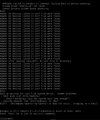I have a fully up to date Ubuntu 18.04 VM that is suddenly failing to boot due to not finding it's logical volume.
I think this may have happened since I updated to Proxmox 7.4.3 but can't be sure as I didn't check it straight away.
If I change the SCSI controller to a non VirtIO SCSI one, it boots ok but then can't find it's network interfaces (VirtIO).
Again if I change those to E1000 that starts working again.

Any ideas? I have the qemu guest agent installed but it seems like the kernel is somehow missing the required drivers.
I think this may have happened since I updated to Proxmox 7.4.3 but can't be sure as I didn't check it straight away.
If I change the SCSI controller to a non VirtIO SCSI one, it boots ok but then can't find it's network interfaces (VirtIO).
Again if I change those to E1000 that starts working again.

Any ideas? I have the qemu guest agent installed but it seems like the kernel is somehow missing the required drivers.

